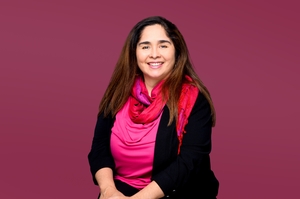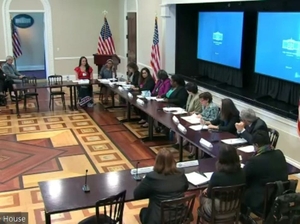Domestic violence impacts more than 10 million people annually and costs the economy over $8 billion per year. Blue Shield of California Foundation’s mission is to support lasting and equitable solutions to make California the healthiest state and to end domestic violence.
The Foundation is an independent, nonprofit organization funded entirely by contributions from Blue Shield of California.

Lucia Corral Pena, chief program director, Blue Shield Foundation
We spoke with Lucia Corral Peña, chief program director at the Foundation, about the work she’s leading to help prevent and end domestic violence, the Foundation’s role in the White House’s first-ever U.S. National Plan to End Gender-Based Violence, and how we can all help in changing the conversation around domestic violence.
Could you tell us a bit about the work you do for Blue Shield of California Foundation?
For 10 years, I led a team focused on statewide grants, partnerships, policy and systems changes to break the cycle of domestic violence — very rewarding work. In my new role as chief program director, I am now part of the executive team, overseeing the Foundation’s entire grantmaking strategy and program design. It has been such an honor to step into this role.
What progress has the Foundation made toward ending domestic violence?
Domestic violence is everywhere — more than half of adults in California are directly affected by it as a victim, close friend or family member, but that doesn’t mean it’s inevitable. We know that it’s possible to heal and to prevent this for future generations.
The shift to preventing domestic violence is somewhat recent for the Foundation. In the past, we funded direct services to victims and survivors, like shelters and crisis intervention. Now, we include work that’s farther upstream, on the policy and systems changes that can prevent domestic violence from happening in the first place. We’ve sharpened our focus on the root causes and the Californians most impacted by domestic violence and health inequity: communities of color with low incomes. That is progress.
And we are also making progress toward ending domestic violence. As a leading funder in this field, we and our grantee partners were invited to contribute ideas to the first-ever U.S. National Plan to End Gender-Based Violence. The fact that prevention is one of the pillars of this plan shows us that we are contributing to the momentum and collaboration — at the state as well as the national level — needed to disrupt the systemic conditions that have allowed domestic violence and health inequity to persist. It has been inspiring to see national leadership on gender-based violence prevention at the highest levels of federal government, boosting potential for real change.
How many people have been positively impacted by the work of the Foundation?
We serve Californians not one at a time, but by the thousands. We made 91 grants last year to organizations across the state. We are so grateful for the steadfast support of Blue Shield of California, which has allowed the Foundation to invest nearly $100 million over the last three years in making California the healthiest state and ending domestic violence.
What is the most rewarding part of your job?
Building community and systems change partnerships that create impact in the lives of California families. Listening to people and leaders in the communities we serve across California, supporting them in developing solutions to the problems that impact them the most, and investing in those solutions is as rewarding as it gets.
What are some of the biggest struggles we face in ending domestic violence?
Domestic violence is a complex issue. Over our decades at the Foundation, we’ve learned that if we truly want to end domestic violence, we have to tackle its root causes: racism, gender inequity and economic inequity. That’s a bold goal! We also have to engage many more people to support solutions that work, and also develop new solutions.
Fortunately, we are not alone in the work to dismantle these conditions. Our grantees across the state are dedicated partners. They consistently tell us that one of the biggest struggles they face is chronic underfunding of domestic violence prevention.

Lucia and colleagues at the White House
What are some recent wins or accomplishments from your team?
The Foundation and our grantee partners made recommendations for the U.S. National Plan to End Gender-Based Violence, and it was my great honor to speak at the White House when the plan was unveiled earlier this year. It’s a big step toward bringing different federal agencies together to collaborate — instead of working in silos — because domestic violence is so prevalent that it shows up in all kinds of sectors, from housing to banking to child care to health care to criminal justice and more. We are so gratified to see that prevention is one of the pillars, and that the administration is calling for greater support of the culturally responsive services that we know survivors and their families need. Now, we are convening the many organizations in California that are well positioned to turn the vision into a reality.
What are the future goals for the Foundation moving forward?
We have to enlist the various systems I mentioned — housing, child care, social services and so on — in the work to prevent and end domestic violence. Survivors and their families do not lead single-issue lives. To better serve them brings us closer to ending this threat.
I’m also excited about work we’ve been cultivating to develop restorative approaches to domestic violence. We’ve learned that for many communities, traditional responses in the criminal justice system are not sufficient to meet community needs or prevention. Restorative practices can be an alternative path for survivors and their families to find safety, healing and accountability in ways that empower them and support their lived experiences.
Ultimately, we are looking to change the conversation around domestic violence. We want people to see it as a health equity issue and a multigenerational issue that can be prevented. We hope to grow the number of people talking about solutions with our new podcast series in honor of Domestic Violence Awareness Month, which you can find on LetsEndDV.org.
If you would like to join our mission to end domestic violence, please check out our current Foundation career openings. You may also find career opportunities with Blue Shield of California on our careers page.
This post was originally published on this site be sure to check out more of their content.






